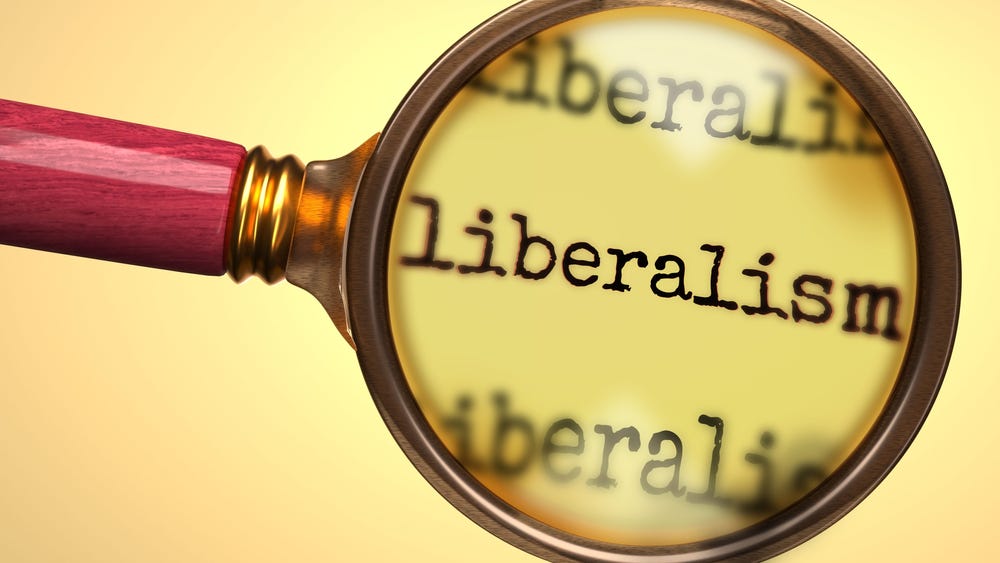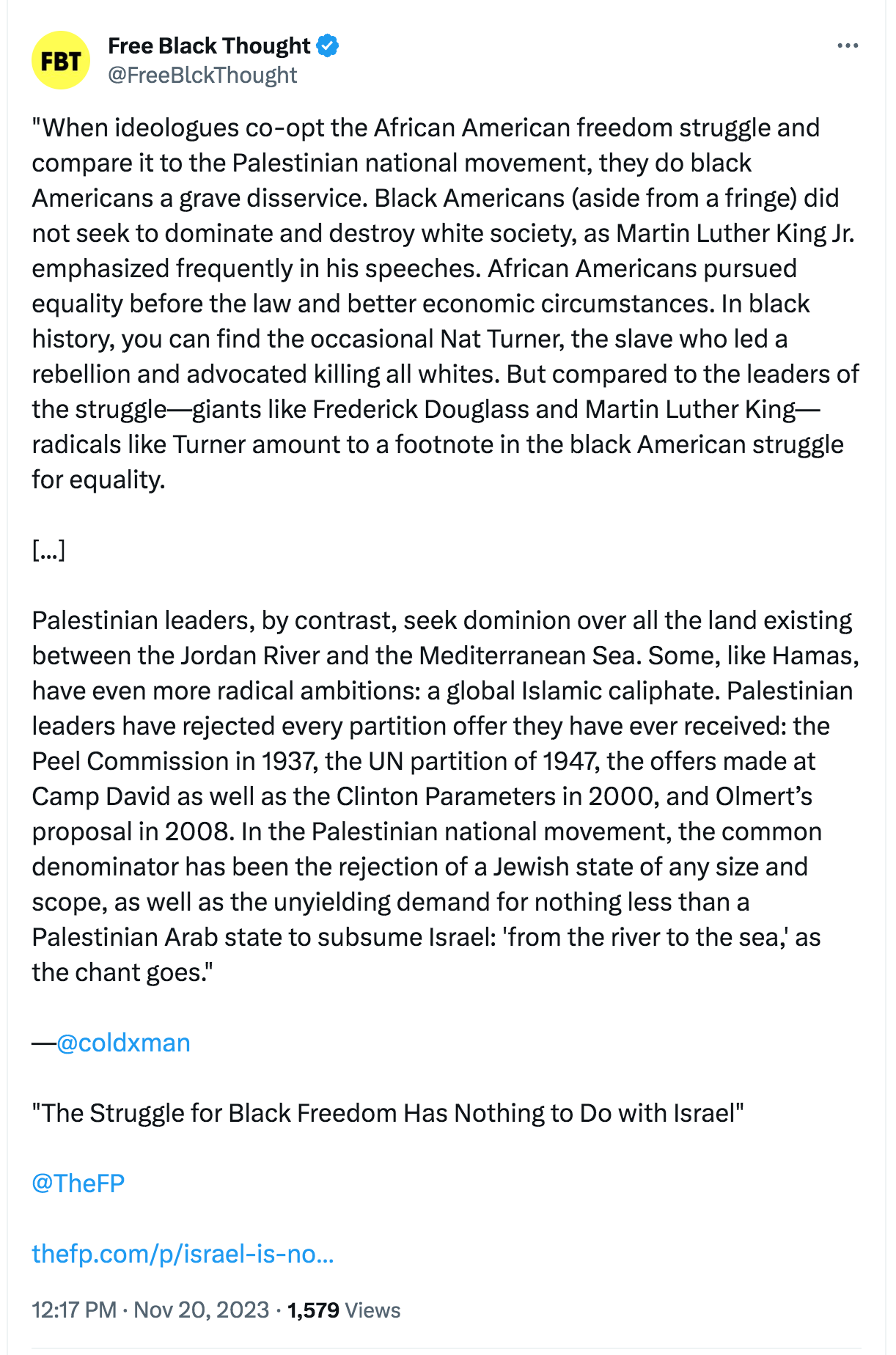E-Pluribus | November 20, 2023
Deconstructing liberalism; a conservative classic turns 70; and Harvard's DEI fiasco.
A round-up of the latest and best musings on the rise of illiberalism in the public discourse:
Aaron Ross Powell: Under Liberalism, a "Civil" War Avoids a Nasty, Actual One: A Conversation With Philosopher Chandran Kukathas
Aaron Ross Powell of The UnPopulist recently spoke with university dean, author and philosopher Chandran Kukathas on the site’s ReImagining Liberty podcast. In the portion of their conversation below, Powell asks Kukathas to examine some of the ways illiberalism slips into the thinking of even those who consider themselves committed to liberal ideals.
Aaron [Powell]: How, in an ideal sense, does a liberal society figure out where the limits of live and let live are? We can stipulate that there are easy cases, like if your living involves murder, we're not going to let live in that case. It seems like a lot of the backsliding you see in liberalism, a lot of the times when people who have claimed liberal values suddenly are expressing illiberal urges are specifically on that.
I was a liberal until liberalism called for accepting transgender identities, and that's a bridge too far for me. I was a liberal until my particular religion became a minority, and then that's a bridge too far for me. It seems like murder is an easy case. Saying I just really don't like redheaded people and that's a bridge too far is an easy case in the other direction, but things get awfully fuzzy in the middle.
Chandran [Kukathas]: They do get fuzzy very quickly. Even with the question of murder, it's not all that clear-cut. Just conceptually, murder means wrongful killing. To say that everyone accepts that murder is wrong is essentially a tautology. Of course, everyone agrees that murder is wrong. That's what murder is. Where it gets difficult is figuring out what counts as murder. Is voluntary euthanasia or assisted suicide murder? Some people would say yes, others would say no. Is abortion murder? Some would say yes, others would say no. Is killing in war murder? Is execution for punishment murder?
Here people just differ enormously. No one differs on the question of whether murder is wrong, but there's an enormous range of views on what counts as wrongful killing. I think this is where saying something like, "Well, I have a liberal attitude," is not going to get you very far, because it's not in itself going to settle the question. Now, one response to this might be to say, "Okay, what we need to do is find the correct answer ethically."
The problem is here, by hypothesis, there is ethical difference. It's not that the people who are differing ethically, some of them thoughtful, and others not, it's actually there are thoughtful people on all sides of this question. What you have to figure out is, where do you go from there? I don't think that this question is settlable ethically, in the sense that there's any hope of a demonstrative solution to this. Of course, everybody will have, holding their own respective views, people who are among the finest minds, who hold the same view, who will be able to offer excellent arguments in favor of that view, whether we're talking about abortion, or euthanasia, or killing in war, and so on, but none of them are going to persuade the other.
The ultimate solution, or answer, is going to be a political answer. It's not going to be an ethical one. Now, this means that when these issues are settled politically, those who have very strong ethical convictions on the subject are many of them going to be distressed, angry, upset about the outcome, because they think there is one correct answer. I think, on the whole, the liberal attitude is going to be, this has to be resolved politically, it cannot be resolved ethically.
Read the whole thing.
Michael Lucchese: ‘The Conservative Mind’ at 70
Just as “liberal” has evolved over time, so has “conservative.” As Russell Kirk’s classic The Conservative Mind reaches its 70-year milestone, Michael Lucchese reviews for The Dispatch how Kirk’s ideas have held up and how they compare to what conservatism has become in its various forms.
[Russell] Kirk’s conservatism is altogether different from what various factions on the right offer today. He was an ardent opponent of libertarians, whom he denounced as “chirping sectaries.” He considered their individualism a danger to traditional society. But Kirk was also a committed patriot and defender of the American constitution—it is doubtful that he would have much sympathy for the so-called “postliberals,” such as Notre Dame political scientist Patrick Deneen, who hold the founding in contempt.
[. . .]
[W]hat exactly is “conservatism” for Kirk? In the introduction to The Conservative Mind, he describes the book as a “prolonged essay in definition.” Rather than a rigid ideology, Kirk’s conservatism is a disposition of gratitude for our civilizational inheritance. He identifies several “canons” of conservatism, such as a belief in transcendent moral order, affection for the variety of life, and a reluctance toward hasty or thoughtless change. These attitudes are the substance of the titular “mind.”
The book is essentially a series of intellectual and political biographies of leading conservative thinkers from the French Revolution through the end of the 20th century. In each, Kirk demonstrates that conservatism is a “politics of prudence,” applying enduring principles to specific circumstances on behalf of the common good. Readers meet eccentrics such as Fisher Ames and John Randolph of Roanoke, novelists such as Walter Scott and Nathaniel Hawthorne, and political leaders such as George Canning and Benjamin Disraeli. These men all contributed much to Kirk’s conservative sensibility, but four tower above them as the great pillars of this body of thought: Edmund Burke, John Adams, Alexis de Tocqueville, and T.S. Eliot.
For Kirk, the Anglo-Irish statesman Edmund Burke is the fountainhead of modern conservatism. His reaction to the French Revolution gives conservatives a playbook for opposing the “antagonist world” it unleashed. In Kirk’s words, Burke believed that “society is a spiritual reality possessing an eternal life but a delicate constitution,” one which “cannot be scrapped and recast as if it were a machine.” Nor did Burke believe society was a mere contract between its living members; rather, it is a bond between the dead, the living, and the unborn. Just as Publius supports reverence for the written Constitution in The Federalist, Burke advocates reverence for the unwritten constitution of custom and prescription. Burkean conservatism is not contemptuous of natural rights, but it prefers to focus on the natural duties we owe one another.
[. . .]
While Kirk’s narrative is powerful, it is not without its shortcomings. Take, for example, Kirk’s somewhat misguided commendation of pro-slavery Democrat John C. Calhoun and his apparent exclusion of Abraham Lincoln. It is easy to understand why Kirk, a localist critic of the New Deal, would turn to Calhoun’s critique of centralization. But it is lamentable that The Conservative Mind does not fully reckon with the injustice of chattel slavery or with Lincoln’s more conservative defense of the U.S. Constitution and our Union. Although his admiration may not be perfectly clear in the book, Kirk lavishes praise on Lincoln as a conservative reformer elsewhere in his writing.
[. . .]
Kirk wrote that “Only just leadership can redeem society from the mastery of ignoble elite.” He believed that conservatives needed to provide an education for leadership that would produce not only great statesmen, but men and women who could lead in their own vocations nearer to home. Kirk was greatly concerned with the degeneration of the family, and believed restoring that fundamental institution was of the greatest importance. The Conservative Mind and his other writings are attempts to provide the “moral imagination” for a political, cultural, and vocational restoration.
Read it all.
Samuel J. Abrams: Harvard’s Shameful DEI Addiction
The amount of attention paid to Harvard University’s policies, DEI or otherwise, might seem excessive until we consider the outsized influence of its graduates in the academy, the legal system and politics. Samuel J. Abrams writes for Commentary Magazine about the school’s corrosive impact on its students, which will continue to surface for years to come.
Harvard has had a long and disgraceful history with antisemitism. Regrettably, the school is again the focus of global attention given its mismanagement of the rise in Jewish hatred in the wake of Hamas’ brutal attack on Israel in October. Harvard’s administration lacked any ethical core and displayed the opposite of moral clarity by failing immediately to condemn Hamas’s actions and support the Jewish student population. Now, Harvard’s latest attempt to combat the deep-seated antisemitism on campus is to double down on using diversity offices—the same dangerous offices that harbor ill will against Judaism and have promoted extremism and silence for well over two decades now.
The disturbing reality of collegiate life today is that diversity, equity, and inclusion offices (DEI) have politicized almost every facet of life on campuses. Students are told what words to use and what topics can be questioned or debated. DEI offices are fixated on the idea of difference and the immutable characteristics of students at the expense of community and shared experiences. From DEI-run affinity group centers to dining centers and residence halls, DEI officers police how students engage with each other. Some students limit their speech, often choosing to self-censor. Should someone slip and conflict with the DEI orthodoxy, there are bias reporting hotlines for students to use. This adds to the anxiety of being a Gen-Z student. Gone are the days of learning how to navigate differences, work with others, and experience both the pain and pleasure of complex, networked life.
Because DEI is built on the unshakable belief that the world is sophomorically divided into simply oppressors and the oppressed, Jews are branded as oppressors and Israel is considered a “ genocidal, settler, colonialist state” in the minds of these offices. As such, a former DEI official rightfully found that “criticizing Israel and the Jewish people is not only acceptable but praiseworthy” and “if you defend them, you’re actively abetting racist oppression.”
Read it all here.
Around Twitter (X)
Here’s Free Black Thought with an extended quote from Coleman Hughes’s Free Press article on the attempt to link the US civil rights movement with the Palestinian case against Israel:
Via Steve McGuire, DEI is delivered a setback in Iowa:
And finally, if you thought a hospital maternity ward’s “diversity assessment” being downgraded for using the term “mother” was a bridge too far… you were wrong:









